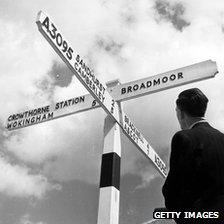Seven of the week's best reads
- Published

Would you bid online to be paid a pittance to fetch coffee for a lawyer?
Seven articles published elsewhere on the web this week, as selected by Bob Trevelyan, editor of The Browser.
1. Obama's way
Michael Lewis | Vanity Fair | 11 September 2012, external
What's it like to be president of the United States? Michael Lewis spent six months with Barack Obama, from basketball court to Air Force One, and this admiring yet perceptive portrait is the result. Mostly, it seems, the job involves an endless string of decisions. So much so that the president pares down the rest of his life to entail as few decisions as possible. "Nothing comes to my desk that is perfectly solvable," says Obama. "Otherwise, someone else would have solved it. So you wind up dealing with probabilities. Any given decision you make you'll wind up with a 30 to 40% chance that it isn't going to work. You have to own that and feel comfortable with the way you made the decision. You can't be paralysed by the fact that it might not work out."
2. Cosmo, the hacker 'god' who fell to earth
Mat Honan | Wired | 11 September 2012, external
You might think that tech writers would know better, but Mat Honan was the victim of a particularly thorough hack attack that threw his life into turmoil. After he'd picked up the pieces he went in search of the perpetrator. Eventually he ended up on a doorstep in Long Beach, California, talking to a 6ft 7in 15-year-old who goes by the name Cosmo the God. As it turns out, Cosmo hadn't hacked Honan, but he was able to tell him how, and why, he'd got past the security systems of many of the biggest names online. Honan describes how he tried out some of Cosmo's techniques for himself. His conclusion? "The only thing I am certain of is that online security is an illusion."
3. The tragedy of the European Union and how to resolve it
George Soros | New York Review of Books | 9 September 2012, external
This is the essay that caused the financier George Soros to be mentioned in many news bulletins at the beginning of the week. In it he calls for Germany to lead or leave the euro. His clear preference is for Berlin to exercise what he calls "benevolent leadership" and indeed Chancellor Merkel, in backing the European Central Bank's bond-buying plan, has appeared to commit Germany to the preservation of the currency. Soros explains how the euro crisis came about and how, although the blame and burden is falling on the "periphery" countries, Germany bears its share of responsibility for what happened. The key questions now, addressed in the second half of this piece, are what should happen next and how to get there.
4. My life as a TaskRabbit
Brad Stone | Businessweek | 13 September 2012, external
Brad Stone goes on a back-breaking, soul-draining journey into what's euphemistically called the "distributed workforce". Essentially, you bid online to do the tedious or unpleasant chores that other people don't want to do themselves. In terms of prices, it's a drive to the bottom - and your temporary employer will leave immediate feedback online about your performance on the job. Stone cleans a house, weeds a lawn, and flattens and removes a mountain of cardboard boxes. He even collects a cup of coffee from a cafe to deliver to someone in a law firm across the street. It may be the future. And it makes me shudder a little.
5. Philosophy v science: Which can answer the big questions of life?
Julian Baggini & Lawrence Krauss | Observer | 9 September 2012, external
A discussion. Philosopher Julian Baggini contends that science is engaging in "mission creep" but should accept there may be limits to its reach. Some things - for instance judging what is morally right or wrong - are better addressed through other disciplines, such as his own, he says. Physicist Lawrence Krauss says science is merely distinguishing between questions that are answerable and those that aren't. Anything answerable, he says, moves into the domain of empirical knowledge, also known as science.
6. A boy's own Broadmoor

En route to the Berkshire hospital
The novelist Patrick McGrath recalls growing up in and around a high-security psychiatric hospital, run by his father.
Then, as now, Broadmoor housed some of Britain's most violent criminals. But McGrath found it an idyllic place to be.
"In the summer holidays we roamed the estate in happy ignorance of the oddity of it all, and not until I was much older did I understand that it was considered strange to have grown up in the grounds of a secure mental hospital. As a small boy you tend not to think about whether you're having an unusual childhood. You have far more pressing matters to attend to."
7. Paddled
Christopher Beam | GQ | 11 September 2012, external
Christopher Beam was a good table-tennis player at home in the United States. Very good. So when he moved to Beijing for work, he thought his proficiency in ping-pong would help him fit in and win the acceptance, if not admiration, of new Chinese acquaintances. How wrong that turned out to be. In this charming piece, he starts off with some intensive training and finds himself routinely thrashed by eight-year-olds. Next, in preparation for his first tournament, he turns for assistance to Coach Deng. "After a while, we break and I ask him what he thinks. 'Let's start with your strengths,' he says. 'Your strength is you enjoy yourself.' I wait for more. 'Your weaknesses,' he goes on - and then proceeds to list every aspect of the game: my grip is wrong, my stroke is flimsy, I don't rotate my torso, my feet don't move. He gestures to one of his friends. 'He is in the sky,' Deng says. 'You are on the ground.'"